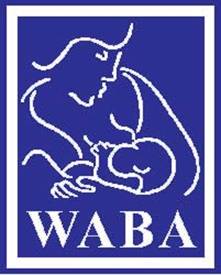by WABA Young Leaders
Frenny Jowi and Bryndís Skarphéðinsdóttir
Young people are key agents of change in conflict prevention and sustaining peace. On International Youth Day 2017 WABA celebrates young people and their contributions to conflict prevention and transformation, sharing with our work across generations, for inclusion, social justice and sustainable peace.
Youth, Peace and breastfeeding!
Breastfeeding and peace. You may wonder what the link is between the two.
In the words of Anwar Fazal, Right Livelihood Award Laureate and Chairperson Emeritus of WABA, “Breastfeeding is about peace and justice. It is the natural and peaceful way of nurturing our children. In a world often wracked by injustice, violence and war, breastfeeding can be a sentinel of peace- inner peace, peace with other people and peace with the environment’’
There are more young people in the world than at any time in recorded human history. Half of the world‘s population is younger than 25 years old. The majority of the younger generation live in developing countries, many of which are countries affected by conflict.
It is very important that young people play a key role in sustaining peace and promoting a sustainable future. It is our future that we are shaping.
Conflicts often tend to arise in poorer countries, that experience wide inequalities, lack of security and cannot meet basic human needs. The protection, promotion and support (PPS) for breastfeeding, when taken seriously and with urgency by communities and governments, demands that we reevaluate our priorities and place people and the planet at the centre of how we organize our world.
Women are at the centre of global development issues. Poverty affects women disproportionately. The feminization of poverty is a social justice issue and we cannot ignore it. Child care and breastfeeding are still largely seen as ‘women’ work’. Unpaid care work confines women and stops them from achieving their full potential. For peace and harmonious co-existence, we must recognise and integrate women’s roles in the work place, politics and all aspects of public life. Women’s breastfeeding rights are directly linked to the common good of our communities. The rights of girls and women are at the core of peacebuilding.
Breastfeeding advances sustainable development by improving nutrition and health, preventing child mortality and by decreasing the risk of both communicable and non-communicable diseases, for both mother and child. When addressed in societal terms the protection, promotion and support of breastfeeding becomes an important enabler to tackle poverty, promote economic growth and reduce inequalities.
Conflicts and refugee producing situations create stressful environments that have a negative impact on the mother’s ability to breastfeed. Mothers in crisis situations often feel forced to turn to bottle-feeding. Breastmilk substitutes lack the immunological benefits of breastmilk. An unhygienic environment and unsafe water mean that a bottle-fed child is up to 25 times more likely to die as a result of diarrhoea or other diseases than a breastfed child.
According to The World Health Organization, more than 820,000 lives, mostly babies under 6 months of age in low to middle-income countries, could be saved annually with increased exclusive breastfeeding. Breastfeeding is one of the top interventions for reducing under-five mortality, as it provides the nutrients needed to survive and thrive.
There are enormous economic benefits to any country from reduced illnesses, costs of health care cost and increased productivity. But not enough funds or attention have been given to the importance of breastfeeding.
This International Youth Day, there are three things that give us hope that by working together, young people can play an active role in building the future we want.
Firstly, World Breastfeeding Week 2017 saw the launch of The Global Breastfeeding Collective. Led by UNICEF and WHO, this partnership brings together some 20 international agencies, including WABA, with the goal of increasing investment in breastfeeding worldwide. Secondly, WABA has aligned World Breastfeeding Week with the Sustainable Development Goals providing a framework for a long-term campaign to achieve our collective ambitions across issues. Thirdly, as WABA Young Leaders, young people have space and support to inform, engage and galvanize others to contribute meaningfully to this process.
Young people have a voice and will hold governments accountable. Together we can build resilient and peaceful societies.
– WABA Young Leaders –

Frenny Jowi is a journalist, digital media and PR consultant who is currently consulting at Media Focus on Africa, as a radio producer, media relations trainer and digital journalism trainer. She also works as a volunteer youth mentor and freelance journalist.


